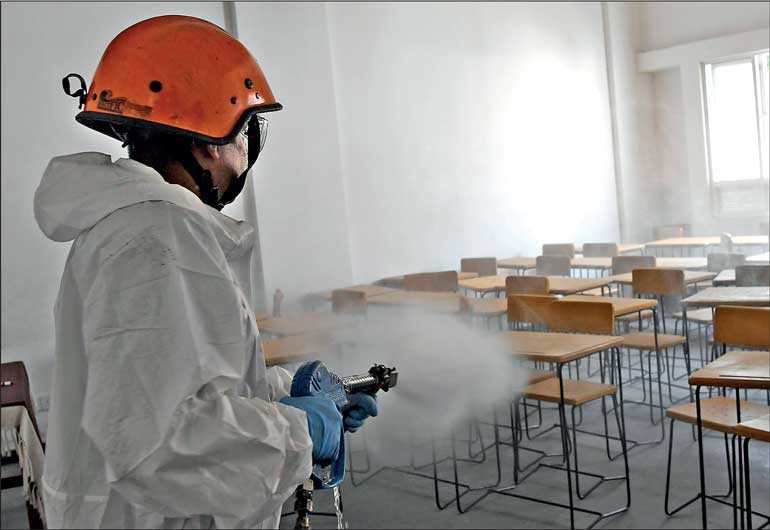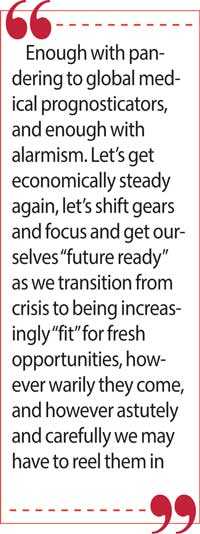Monday Feb 16, 2026
Monday Feb 16, 2026
Friday, 19 June 2020 00:30 - - {{hitsCtrl.values.hits}}

There is a cottage industry of pontificating “post-COVID” as the unromantic realities of the sheer scale of economic devastation wrought are coming home to roost. 
So, as Lanka seeks to “suit up” and gear up, and dive into the fray, as we seek to invigorate and focus what was pre-COVID an already relatively weakened and debt burdened economy, it can seem more than daunting.
Companies have to be the lifeblood of this recovery and “magical thinking” or patriotic slogans (no matter how stirring) or developing economy homilies, will none of them, suffice here.
Let’s ditch the COVID mania please
The first thing we have to make our peace with globally, not just here, is we cannot continue the charade that we didn’t over-react to COVID, or that now, almost as if it were a new state religion we have to mulishly continue observing the rituals of containment, as if this were some world blighting contagion, rather than moderately dangerous influenza, hyped up beyond all precedent.
If in another week, there aren’t vast outbreaks of infection in all the places where protests have been raging, then that, plus the overwhelming Asian data, data from Europe post opening up, data from all the US states that have re-opened, may finally be so overwhelming that even mainstream opinion may give up the ghost of quaking so indiscriminately at this pathogenic altar.
Being personal can’t be perpetually dangerous
If no local transmission here as we are told, why are we petrified? The masks are helpful in intimate service settings for a bit just to alleviate concerns, but five temperature checks per establishment and marks on the floor showing what “one metre” looks like are getting a tad silly.
You need close sustained contact with someone symptomatic from the best medical input we have, or possibly mildly symptomatic at least, and so a measured distance, without drawing circles everywhere, will surely work. And since fatality rate is so negligible for the young and for everyone without pre-existing conditions, at some point, people have to be allowed to socialise; and we must trust more in our immune systems than our ability to continue to “police” and “order” and “terrorise.”
Focus on productivity
Enough also with the “safety of all our staff must be our paramount concern” and so on, as if it’s a novel idea. Is there a time when “safety of staff” should not be paramount? COVID may be another variable, but good safety practices, should be renewed and we must ensure “costs” are not so excessively imposed on the competitive landscape that they render us unable to compete.
Don’t come to work if ill, wash hands, if in close quarters, wear masks. Wear gloves where needed. Take temperature checks occasionally. Nothing more rationally is needed from the best we know. And then, let’s make something someone wants to buy, valuably and competitively, and connect with customers and markets and let’s stop this zombie apocalypse melodrama over something that has taken less lives than virtually any major cause of mortality in Asia.
Ask for creativity not just resilience
If you shut your business down for months, make people work remotely, survive on pay cuts, deal with disappearing demand, sure “resilience” is needed. But it’s insane as the primary prescription going forward because no one is going to pay you to be resilient. They will pay you for making their lives better in some way.
Peter Drucker said, “The purpose of a business is to create a customer.” And that means being distinctively, competitively, able to serve that customer in a way that is differentiated from others in some way. The words “distinctive,” “competitive” and “differentiated” will mean different things now, but those are the words to focus on.
The idea of having a “working capital team” makes eminent sense right now rather than just fixating on “costs,” the one grand idea some businesses seem to have taken possession of. Chasing collections and alienating people who are themselves just rebounding and recovering can be self-defeating. However, allowing people to use crisis as an excuse to not meet their commitments and obligations, or to be unwilling to enter into a mutual dialogue, undermines and erodes any existing relationship and just showcases the real values operating. There will have to be give and take, mutual flexibility.
Any business focused purely on “collections,” though, had better be literally on the brink of survival. Because absent a pipeline of new business and given inevitable delays that are unavoidable on the above, this is simply akin to letting lungs collapse while you work on pumping temporary oxygen into a once vital system. Imagine if instead of creating new business, everyone just runs around “collecting” from everyone, and we “collect” ourselves into a mass economic grave. So, keep offering innovative value, ask for what you are owed, but seek to build fresh business value relentlessly, even if initially modestly, as you do.
Cut costs and invest
Certainly, with greater remote working and enlarging digital capabilities, less “space” may be needed, and premium rental space for numerous industries will become for some time a luxury and not a need.
Stephen Covey’s quadrants of time management can be parlayed for value management. Identify those things that are “Urgent and Important” (that gets first call on cash), then “Important but not Urgent” (this goes next, building capabilities, engaging and energising the team that’s left, creating new working relationships with clients, strengthening digital capabilities, nearshoring and rationalising supply chain, etc.). Then comes “Optional” (and this needs careful debate strictly in terms of real “value” and  “providing tangible short-term business or balance sheet benefit”). And finally, “Waste” (layers of stupid bureaucracy, lack of decision-making clarity, communication obfuscation, outmoded processes and half-witted procedures) which we should ruthlessly prune and eliminate, and the business relief will be significant.
“providing tangible short-term business or balance sheet benefit”). And finally, “Waste” (layers of stupid bureaucracy, lack of decision-making clarity, communication obfuscation, outmoded processes and half-witted procedures) which we should ruthlessly prune and eliminate, and the business relief will be significant.
A word to the wise re remote working
There are all kinds of benefits that have been voluminously catalogued and that needn’t be recounted here. But this depends on relationships already in hand to some extent. You are not going to forge trust, at least until we rewire our psychological, social and emotional attitudes, aptitudes and reflexes, with someone on first encounter, on a glowing screen. None of these interfaces are seamless, yet, anyway, far from it.
You also can’t just improvisationally connect with someone this way. Generating a quick “huddle” to brainstorm or problem solve assumes everyone is “available” at the same time wherever they are. Then you may have to pay them to have a home office if this is more than an interim measure.
We can have fewer permanent offices, more flexible working, as long as we maximise and ensure encounters that do take place are meaningful, relationship growing, actual exchanges of ideas and accountability and best practice. We cannot have formulaic, plodding, energy-leeching, monotonous get-togethers in a moment of existential crisis and potentially disruptive possibility.
Pre-existing relationships and habits cultivated more conventionally by business practice and mentoring, can be still further fostered and leveraged remotely. But no one has a theory as how these would just be initially created in isolation, without that base to build on and from. The theories being bandied about are totally lacking in any suitable discussion of this reality. So, we must consider remote working certainly among the suite of options, but don’t “bank” on it exclusively.
Demand recovery?
Who knows when and how much and where re-emerging demand will go? Certainly, industries that keep adding new layers of costs, or customer alienating strictures, or where we think we just need to sit back and wait for the next tidal wave of demand, may be waiting for quite some time.
How can we make it easier to say “yes?” Take tourism, most people want to travel, not be treated as a mobile biohazard that has to be perpetually and recurringly vetted, assessed, locked up on a moment’s whim, and have all their liberties suspended. So, we need to find ways to make even “safety” part of a sane, appealing, hospitality experience.
The moment we realise this isn’t the Black Death, and no one has asked us to run a concentration camp, the better. All such businesses from retail, to hotels, to airlines and more have to revisit each “moment of truth” and see how we shine in service terms, and governments and policy makers have to be part of the “hospitality” mindset, while providing the necessary safety guard-rails insightfully.
In other sectors too, how can we deepen relationships, sharpen niches, focus production, create value partnerships across the entire delivery continuum? We have to ask ruthlessly, “Why would anyone buy from us?” And to that we can add, “How can we make the value we offer increasingly distinctive, even remarkable?” Perhaps we will be a smaller business for a while, but can we find new profit pools, can we deepen them? Are there adjacent competencies or opportunities we can locate and leverage? Surely, we have to create project teams, made up of our best, entrusted with doing so.
Do it now… or ASAP
We wait for crisis, and it’s too late. So, let’s look at restructuring, rationalising, creating a “crisis fund,” run scenarios for different shapes of recovery, and put into our strategic planning cycle “war gaming” various crises. So, preventive health is necessary, therefore, strengthening the corporate immune system, assigning a percentage of profits that go to proactive preparation, just as we invest in medical insurance, education, or savings.
And certainly, there is one of the most neglected areas: succession planning. Do we have the bench strength of leaders who can engage and mobilise stakeholders, have credibility with partners and financial sources, who are able to foster the relationships and cultivate the credibility to strategically influence policy makers, and who customers trust and will collaborate and cooperate with? Or is there a steep fall off a hierarchical cliff, below Executive Committee level, full of technicians and subject matter specialists, who have been kept burrowing away, without perspective, or without being groomed for larger strategic leadership?
Also, on this theme, of now or ASAP, anyone with a supply chain who doesn’t consider that an overwhelming strategic priority and acts accordingly, with an eye towards revisiting sourcing, rationalising and just-in-time, has suicidal tendencies.
And then we must surely pay attention to how our customers actually evolve as recovery takes place, creating hypotheses and controlled experiments in terms of responding, that allow us to course correct closer to real time.
Marketing, HR, and more…
Two of the greatest untracked, in terms of ROI, costs in businesses are advertising and training. Where does marketing move from spinning off promotions and ads, being a mysterious domain, to one that goes back to creating, uplifting and connecting through brands that have real capabilities that people value, or that communicate associations people wish to embrace? And can we stop thinking of channels, sales and promoting as being separate fiefdoms? How will marketing grow and sustain value in this remarkable period? This demands to be considered and answered.
And training is another absurdly engaged upon exercise in normal times even, where people fill out “happy sheets” as if their subjective experience is what we’re trying to foster. If the aim is to say “thank you” or as an “incentive,” then sure. Otherwise, we need vastly less training and far more focused coaching and capability building, with external resources who are not transactionally appointed, but who are true “trusted advisors.”
You will negotiate better rates with such partners, you can focus them on transfer of competencies and not just “delivery,” and they gain in their insight into you and your culture and can taper what they offer accordingly. Creating internal coaches in key areas to fortify and reinforce these chosen areas of development focus is an excellent idea, it fosters ownership, shaves costs further, develops key people, and enhances organisational competencies.
So in this quadrant, do less, do what really matters, and invest more in a process that delivers an ROI, rather than seeing how far you can “stretch” some broadcasted training budgetary number by which to herd as many people through some undifferentiated mill as possible.
Three types of meetings: Government through corporates
You need to review governance, operating practices, compliance, and more. That’s one set of key meetings, with guidelines, deliverables and more.
You need to review strategy and its conversion into meaningful, focused, organised, targeted action. Governments like Singapore have excelled in having key national and economic priorities converted into real “projects.” Project progress meetings are next therefore, with projects hard-wired to strategic imperatives.
Third, operational results, troubleshooting, meeting milestones, shifting tactics, reviewing “lead” indicators and not just “lag” indicators.
If these were a fulcrum for results across the board, in government circles and across companies (where you usually have some version of this, but with usually too much mismatch of focus) there would be so much more of a drive nationally towards aligned upon priorities for progress.
Insist on and influence national resilience
Sri Lanka has not been rated particularly highly on national resilience indices and has been highlighted as being a particularly vulnerable and “at risk” economy during the pandemic period.
Yet we know this place has rebounded, recreated, re-set, and re-invented itself many times. Leading companies have to demand proactive and meaningful financial reform, simplification of regulations, an intelligent balancing act between fostering local enterprise and supporting international engagement, focusing truly on human capital and IT excellence to be positioned as a service hub, to be a “smart place” to do business from (think Singapore and Hong Kong before the Beijing “blues” beset it) in terms of tax rates, corporate transparency, rule of law, labour market. These are difficult, thorny, highly politicised areas, and hence require corporate influencing and partnership.
But back to the maxim of a thousand-mile journey and the need for vision that moves us past today’s blinkers and chains while protecting and nurturing meaningful cultural roots and value.
Corporates hamstrung by an indebted society swinging at vanity projects that now post COVID become more and more speculative, unwilling to step forth and be heard to help make necessary economic choices, are just tap dancing on quicksand. So, leading companies have to not just show up in front of government with a begging bowl, but as creative catalysts, with their own leadership ideas, their ability to contribute to the national exchequer leveraged meaningfully to influence constructively.
If we all get the leaders we deserve, we all get the societies we will tolerate. “Third world” can’t mean “third rate” or “satisfied with dysfunctionality.” We have to pass on a credible, competitive landscape to our next generation and then challenge them to grow up and make the very most of it, to help Sri Lanka transform in the direction of its potential.
Going forward
We grow businesses and then they grow us. We mint citizens, we incubate capabilities. Taiwan managed to grow through COVID in the first quarter of 2020. We should aspire to do that in such a future instance.
They kept their economy open, despite proximity to the mainland and a large percentage of migrant workers, they are among the great global success stories. Twenty three million, not far away from us there, 445 cases in total, seven deaths. And again, they grew, did not contract, certainly no curfew, no lockdown.
We must learn from these exemplars to do even better when the next phase comes if it does, or the next crisis hits. Let’s benchmark and further build our national, corporate, social and personal capabilities so we can defy, next time around, herd mentality and lemming behaviour and move the needle positively re global statistics through our results and lead.
Enough with pandering to global medical prognosticators, and enough with alarmism. Let’s get economically steady again, let’s shift gears and focus and get ourselves “future ready” as we transition from crisis to being increasingly “fit” for fresh opportunities, however warily they come, and however astutely and carefully we may have to reel them in.